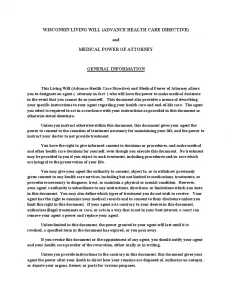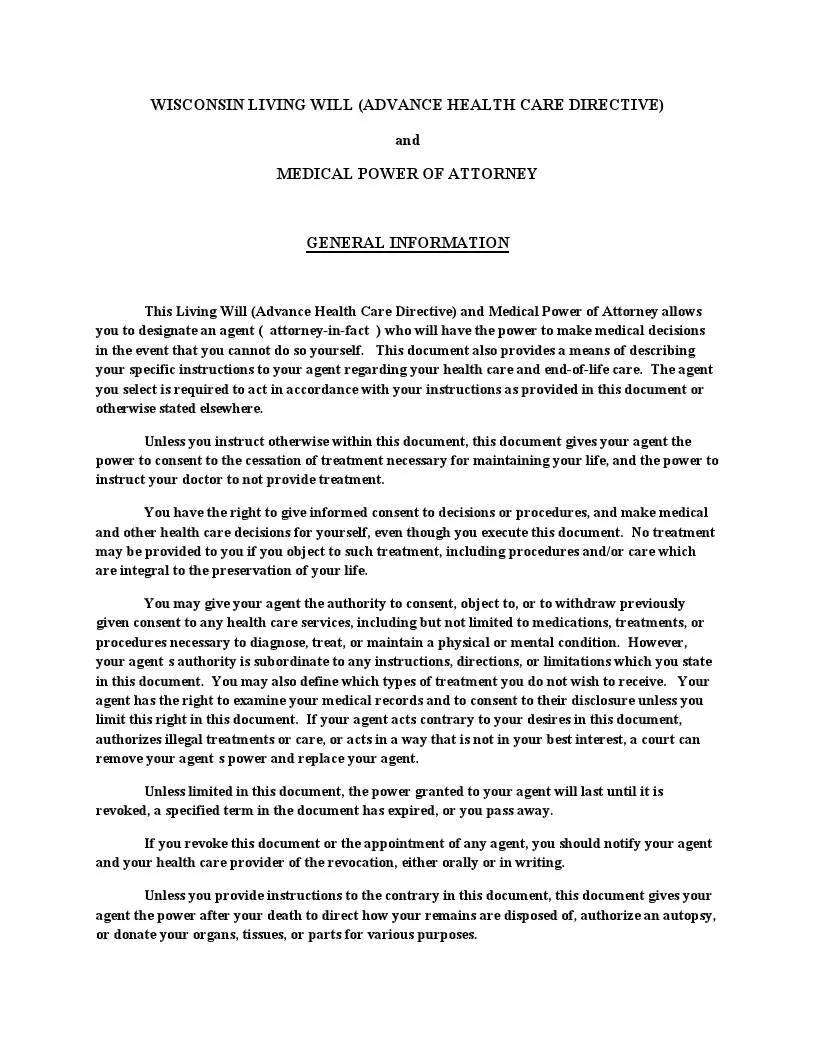Free Wisconsin Living Will Form
In Wisconsin, a living will form is a legal document that allows you to express your wishes regarding medical treatment if you become incapacitated and unable to communicate your decisions. This document is especially important in situations where life-sustaining treatment is being considered.
A Wisconsin living will covers scenarios in which you are in a terminal condition or a persistent vegetative state and are unable to communicate your healthcare preferences. You can specify whether you want life-prolonging treatments, such as feeding tubes and ventilators, or if you prefer to refuse such treatments.
The living will becomes effective when your doctor who has examined you certifies in writing that you are incapacitated and in a medical condition specified in the document. Healthcare providers in Wisconsin must follow the instructions in their living will as long as they conform to reasonable medical standards. If a provider is unwilling to follow your directives due to a moral or ethical disagreement, they must transfer your care to a provider willing to comply.
Signing Requirements and Laws
Creating a living will in Wisconsin must comply with specific legal requirements to ensure its validity. These requirements are laid out in the Wisconsin Statutes & Annotations, which guide documenting one’s healthcare preferences. Adherence to these statutes is crucial for the living will to be recognized and acted upon by healthcare providers.
The individual making a living will, known as the declarant, must be a competent adult, meaning they are at least 18 years old and possess the mental capacity to make informed decisions regarding their healthcare (Section 154.03).
The living will must be in written form. Under Wisconsin law, oral declarations are not recognized as they may lead to ambiguities or misunderstandings regarding the declarant’s true intentions. The living will must be signed in the presence of two qualified witnesses. Here are the specifications for witnesses:
- Age. Both witnesses must be at least 18 years old.
- Impartiality. Witnesses should not be related to the declarant by blood, marriage, or adoption.
- Non-beneficiaries. Witnesses must not stand to inherit any part of the declarant’s estate, either through a will or by law.
- Non-medical providers. They should not be currently involved in providing healthcare services to the declarant.
The declarant may revoke a declaration at any time without regard to mental or physical condition. Revocation can be done through a written document, destruction of the declaration, or an oral expression made to two witnesses or the attending physician (Section 154.05).
If a physician is aware of a living will, they must document its existence in the patient’s medical records. Physicians must comply with the living will or transfer care to another physician who will honor the declaration.
Wisconsin Living Will Form Details
| Document Name | Wisconsin Living Will Form |
| State Form Name | Wisconsin Declaration to Physicians (Living Will) |
| Signing Requirements | Two Witnesses |
| Validity Requirements | Sections 154.03 |
| State Laws: Wisconsin Statutes, Chapters 154.01 to 154.15 | |

Steps to Fill Out the Form
Filling out the Wisconsin living will, officially known as the “Declaration to Physicians,” is a crucial step in planning for future healthcare decisions. Here’s how you can complete the form correctly.
1. Enter Your Full Name and Address
Start by entering your full legal name and residential address in the spaces provided at the beginning of the form. This will identify you as the declarant, the person making the declaration.
2. Specify Your Wishes for Terminal Conditions
Indicate your choices regarding life-sustaining procedures if you have a terminal condition. You need to check the appropriate box to state whether you wish to receive feeding tubes under these circumstances.
3. Make Decisions for a Persistent Vegetative State
Decide and mark your preferences concerning life-sustaining procedures if you are in a persistent vegetative state. It includes both medical interventions and the use of feeding tubes. Be clear about whether you want these procedures withheld or applied.
4. Sign and Date the Form
Once you have specified your healthcare directives, sign and date the form in the designated area. This step legally enacts the form once the required witnesses also sign it.
5. Witness Signatures
Two witnesses must sign the form, attesting that they believe you are of sound mind and that they meet all the qualifications for witnesses as specified by Wisconsin law. Witnesses cannot be related to you by blood, marriage, or adoption nor stand to benefit from your estate.
6. Record the Document with Relevant Parties
While not mandatory, it is advisable to register the completed form with the Register in Probate in your county of residence for safekeeping. Additionally, provide copies to your primary healthcare provider and any appointed healthcare agent to ensure they know your preferences.
7. Review and Update as Necessary
Regularly review your living will to ensure it still reflects your current wishes. You can revoke or amend the document anytime if your circumstances or preferences change. Be sure to communicate any changes to all copies of the original document.

Below are various other Wisconsin templates completed by our users. Try our simple builder to customize these forms to your preferences.
Other Living Will Forms by State
